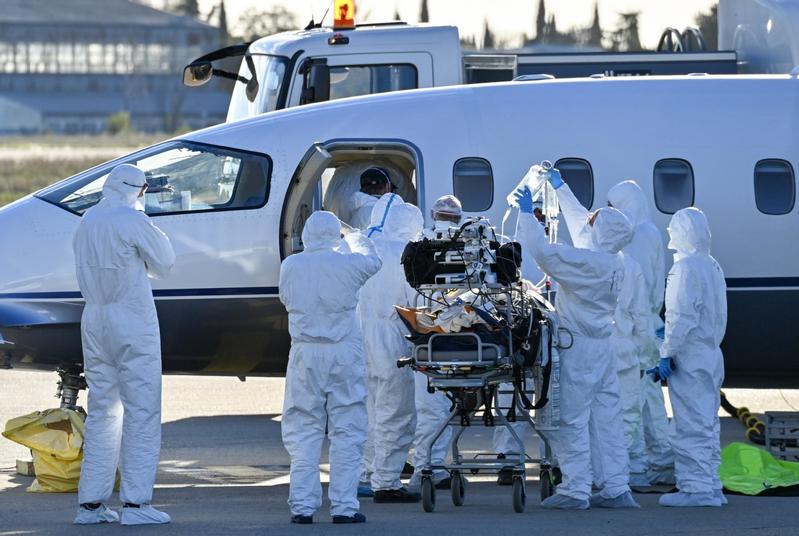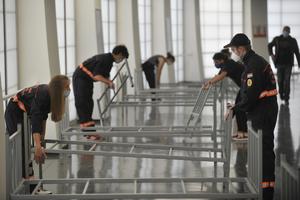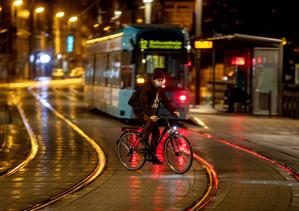Nations head back into different forms of lockdown
 Medical workers escort a COVID-19 patient to an evacuation plane at Nimes-Garon Airport in Saint-Gilles, France, on Tuesday. (PASCAL GUYOT / AFP)
Medical workers escort a COVID-19 patient to an evacuation plane at Nimes-Garon Airport in Saint-Gilles, France, on Tuesday. (PASCAL GUYOT / AFP)
When Belgium was hit hard by a second wave of coronavirus cases in recent weeks, medical workers who tested positive but showed almost no symptoms continued their work at a hospital in Liege, about 100 kilometers southeast of Brussels.
Alexandre Ghuysen, head of the emergency department at CHU Liege, the city's university hospital, said the decision to carry on working had been a difficult one.
"It (the outbreak) is getting worse and worse. We are reaching a critical point," he told reporters, adding that there has been a struggle every day to come up with solutions to find enough hospital beds and staff members.
"I mean there's a point where there's nothing but bad solutions. It's the point we are reaching now," he added.
Belgium, with a population of 11.5 million, less than half that of Shanghai, reported more than 100,000 new COVID-19 cases in the past week, or over 15,000 a day.
The number of cases and deaths in the country have exceeded 412,000 and 11,000, respectively. In per capita terms, they are among the highest in the world.
On Saturday, 1,105 COVID-19 patients in Belgium were in intensive care units, 48 more than the previous day, according to the country's health authorities.
Before the weekend, Belgian Foreign Minister Sophie Wilmes, 45, a former prime minister, was discharged from Delta Hospital in Brussels after spending nearly a week in an ICU for COVID-19 treatment.
On Monday, the second nationwide lockdown took effect across Belgium, following a four-week shutdown of restaurants and bars ordered two weeks earlier.
Belgian Prime Minister Alexander De Croo told a news conference on Friday: "Our country is in a state of sanitary emergency. The pressure is immense, as you have undoubtedly seen in recent days.
"At the moment, there is only one choice, and that is for all of us to support our healthcare sector as much as we can. We have to limit our physical contact as much as possible," said De Croo, who took office a month ago.
He added that the sole purpose of the strict lockdown measures is to ensure that the country's healthcare system does not collapse.
The measures, which will be enforced until Dec 13, will shut down all non-essential stores. However, collections and home deliveries of products ordered in advance are allowed. Outdoor gatherings are limited to a maximum of four people, who must wear face masks and maintain social distancing.
 A restaurant prepares to close in Rome, Italy, on Oct 26 as the country battles a second wave of COVID-19. (TIZIANA FABI / AFP)
A restaurant prepares to close in Rome, Italy, on Oct 26 as the country battles a second wave of COVID-19. (TIZIANA FABI / AFP)
The autumn school holidays have been extended to Nov 15, after which primary school pupils and first grade students at secondary schools will return to classes. Only 50 percent of students in second and third grades at secondary schools will be permitted to return, with the remainder having to learn remotely. All college classes will be conducted online.
Working from home, if possible, is mandatory. If this is not possible, face masks and social distancing are obligatory. Meanwhile, nighttime curfew measures imposed two weeks ago remain in place.
Meanwhile, Germany announced a partial nationwide lockdown, which took effect on Monday. The so-called "lockdown light" is less strict than that enforced in the spring.
Restaurants and bars have been closed, but takeouts are allowed. Overnight stays in hotels for tourism purposes are forbidden. Theaters and cinemas are closed and large-scale events have been canceled. However, soccer matches will continue to be played behind closed doors.
People are being encouraged to work from home, but schools and kindergartens will remain open, as will shops, with one customer allowed every 10 square meters.
Announcing that the measures would remain in force until the end of this month, German Chancellor Angela Merkel told a news conference on Wednesday: "We are in a very serious situation. We must act, and now, to avoid an acute national health emergency."
Merkel indicated that the number of people in ICUs had doubled over the past 10 days and that in many areas it was not possible to track and trace chains of infection. The origin of infection in 75 percent of cases is not known.
"If infections continue at this rate, we will be at the limits of the capacities of our health system," said Merkel, whose pandemic response in the spring won her praise at home and abroad.
In the week to Oct 25, Germany recorded 67,207 new cases and 255 deaths. With a population of 83 million, seven times that of Belgium, its total numbers of cases and deaths are close to those of its neighbor.
Hours after Merkel spoke, French President Emmanuel Macron announced a nationwide lockdown, which started on Friday.
Under stringent measures that will remain in place until at least Dec 1, people in France, which has a population of 67 million, will only be allowed to leave their homes to shop for groceries, keep medical appointments and go to their jobs if they cannot work from home.
"As elsewhere in Europe, we are overwhelmed by a second wave that will probably be more difficult and deadly than the first," Macron said.
On Saturday, Greek Prime Minister Kyriakos Mitsotakis announced that bars, restaurants and other venues in the country's most populous areas would be closed for one month from Tuesday.
A week ago, Italian Prime Minister Giuseppe Conte also announced new nationwide restrictions despite opposition from regional leaders and street protesters.
Theaters, cinemas, gyms and swimming pools have been closed, while restaurants and bars must stop serving at 6 pm. Face masks are mandatory, except at home. Some regions have imposed evening curfews.
Conte said he wants to give the latest measures two weeks to have an effect before deciding whether a more comprehensive lockdown is necessary.
Italy, the hardest-hit European country by the pandemic in the spring, reported 31,000 new cases on Friday.
New measures have also been announced in other European Union countries such as Spain, Portugal, the Netherlands, Ireland, Sweden, Denmark and the Czech Republic.
 Clashes break out on Oct 26 during a protest against measures imposed by the authorities to curb the spread of COVID-19 in Turin, Italy. (CLAUDIO FURLAN / LAPRESSE / AP)
Clashes break out on Oct 26 during a protest against measures imposed by the authorities to curb the spread of COVID-19 in Turin, Italy. (CLAUDIO FURLAN / LAPRESSE / AP)
Taken by surprise
The second wave of COVID-19 cases has taken many EU member states by surprise.
Some of them have blamed lockdown fatigue among the public after weeks of staying home in the spring. After these measures were lifted, many people stopped taking precautionary measures such as wearing face masks, washing their hands and maintaining social distancing.
This summer, tens of millions of tourists visited EU member states, most from other countries within the trading bloc, but also from a dozen nations outside the Schengen Area.
Figures show that the second wave has been driven by young people, with wild parties held by college students making headlines, especially those that took place before new lockdown measures were enforced.
On Thursday, European Commission President Ursula von der Leyen said travel was not the only factor that caused the second wave, and there have been "many variables".
She said that when the number of cases fell in summer after the first wave, "we obviously relaxed some measures too rapidly".
"We will have to be very careful with lifting measures," she added.
In most EU states, rigorous contact tracing, isolation and quarantine are either non-existent or have been applied loosely and on a voluntary basis. On the Chinese mainland and in East Asian countries and regions such measures have been effective in controlling the virus.
Mike Ryan, executive director of the World Health Organization's Health Emergencies Programme, said that if there is one thing that might change the situation in Europe and North America, it is to ensure that each contact of a confirmed case is quarantined for an appropriate period, in order to break transmission chains.
"If you are a case and you are positive, you should be at home in full isolation or in a clinical care facility. If you know you have been in contact with a case, you should be in full quarantine at home without contact with other people," Ryan said.
 Workers set up hospital beds for COVID-19 patients at a sports hall in Zagreb, Croatia, on Oct 26. (PHOTO / AP)
Workers set up hospital beds for COVID-19 patients at a sports hall in Zagreb, Croatia, on Oct 26. (PHOTO / AP)
Maria Van Kerkhove, the WHO's technical lead on COVID-19, said countries cannot rely too much on any one measure.
"What we have seen in some countries is overreliance on some measures more than others," she said, adding that all interventions, from testing, contact tracing to quarantining, need to be used.
Ryan said one thing that differs in the response seen in Asia to that in Europe has been the ability in Asia to follow through on such interventions-in particular, quarantining contacts.
"Once they got the numbers down, they followed through. They didn't start reducing testing centers, they increased testing centers. They didn't start reducing clinical capacity, they increased clinical capacity," said Ryan, an Irish epidemiologist by training.
"In other words, they ran through the finish line and beyond, and they kept running because they knew the race wasn't over. The finish line was false."
Ryan also praised governments in East Asia for providing support for contacts in quarantine, a factor that has not been witnessed to any significant degree in Europe.
He believes that one advantage Asia has is that people and communities have a high level of trust in governments and comply with their instructions.
Tomasz Michalski, an associate professor in the Economics and Decision Sciences Department at HEC Paris, a business school, feels that some government measures are ineffective, such as curfews after 9pm.
"This has meant that for many restaurants and bars, life shifted to 6pm-9pm, with the spread of the virus unchecked," he said.
EU leaders have called repeatedly for coordinated measures, but member states often want control of their own policies despite the fact that most of them have not enforced border restrictions during the pandemic.
"The EU does not have the power to impose sanitation measures on member states," Michalski said.
At a video conference on Thursday, leaders from the 27 member states pledged improved cooperation in the fight against COVID-19, including keeping borders open, better testing and contact tracing, and making plans for the rapid manufacture and distribution of vaccines.
The EU also agreed to finance the transfer of patients across its borders to prevent hospitals being overwhelmed by those with the disease.
Von der Leyen said she understands just how tired and worried people are. "We are all wondering when we will come out of this crisis, but now is the time for patience, for determination and for discipline from all of us, from governments right down to each of us individually," she said.
The various new lockdown measures were introduced after it was announced on Friday that the 19-member eurozone economy expanded by 12.7 percent in the third quarter of this year. However, the impact of this is likely to be short-lived, given the strong second wave of the virus and new lockdowns.
 A cyclist protects himself with a face mask in downtown Frankfurt, Germany, on Oct 26. (MICHAEL PROBST / AP)
A cyclist protects himself with a face mask in downtown Frankfurt, Germany, on Oct 26. (MICHAEL PROBST / AP)
On Thursday, the European Central Bank indicated that it would step up monetary policy next month to counter further economic downturns, but Christine Lagarde, the bank's president, described the European economic outlook as "fairly dark".
"Risks are clearly, clearly tilted to the downside," she said.
Lagarde called for quick agreement on the 750 billion euro (US$876 billion) Next Generation EU fund to help member states' economic recovery. However, the European Parliament and European Council failed to reach an agreement on the fund last week.
Andrea Consiglio, a professor of mathematical finance at the University of Palermo in Italy, said the fund will be crucial. Italy, left alone to face market forces, would barely manage its debt, he said.
Economic predictions
The European Commission Summer Economic Forecast projects the eurozone economy to contract by 8.7 percent and the EU economy to shrink by 8.3 percent this year. The autumn forecast will be released this month.
Michalski said that in France the biggest difference with the second lockdown is that primary and secondary education remains open, allowing parents to work, and preventing a major loss in GDP.
He estimated that each week of the lockdown could cost the French economy 0.5 percent of its annual GDP in the short term.
"This is a terrible shock, especially for small and medium-sized firms, which are being closed at the most important time of the year," he said.
On Thursday, the French government announced a new 20 billion euro aid plan for small businesses and sectors hit hard by the pandemic.
The following day, De Croo, the Belgian prime minister, told his citizens: "We know the virus has a heavy economic cost. Many people have to stop their activities again. The government will do everything it can to support you."
Kai Xin, who runs a Chinese restaurant in the center of Brussels with her husband, said the government has promised to help, but she has not received any money yet.
She said the business has been hit by big losses and the couple are struggling to survive by operating takeout and delivery services.
"If the situation continues like this, I don't know how long we can keep the restaurant," she said.
Agencies contributed to this story.


